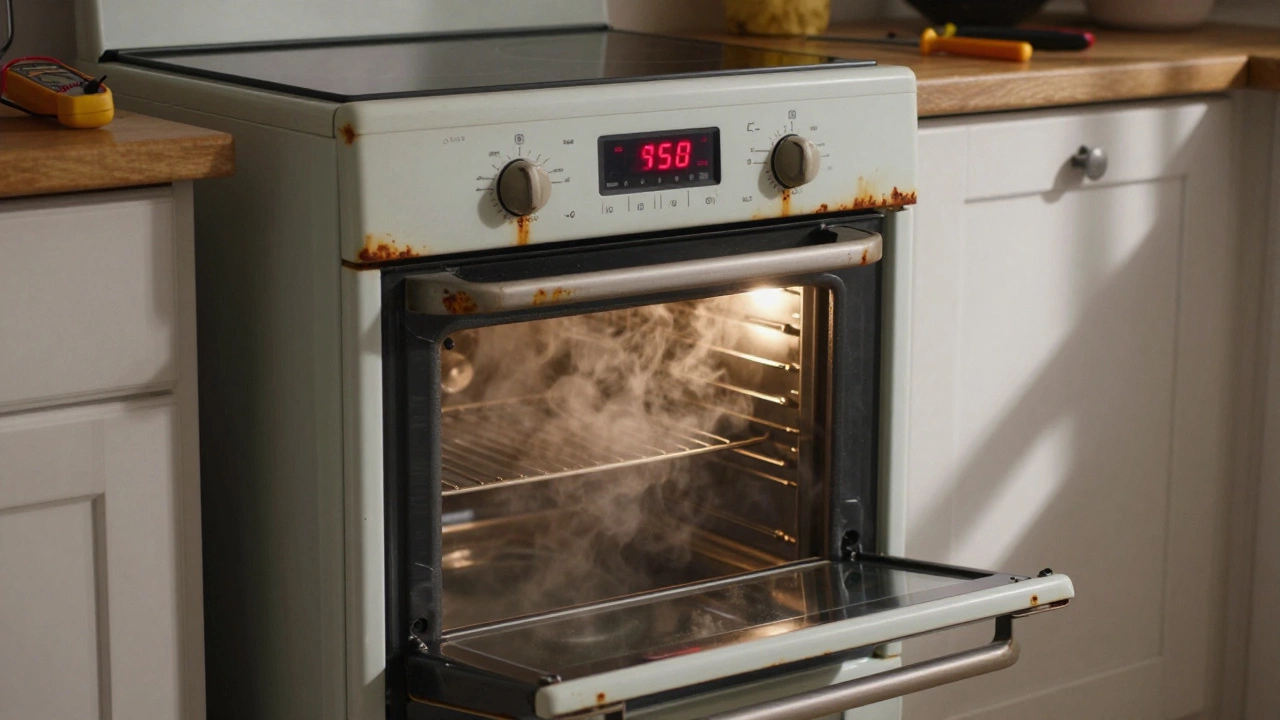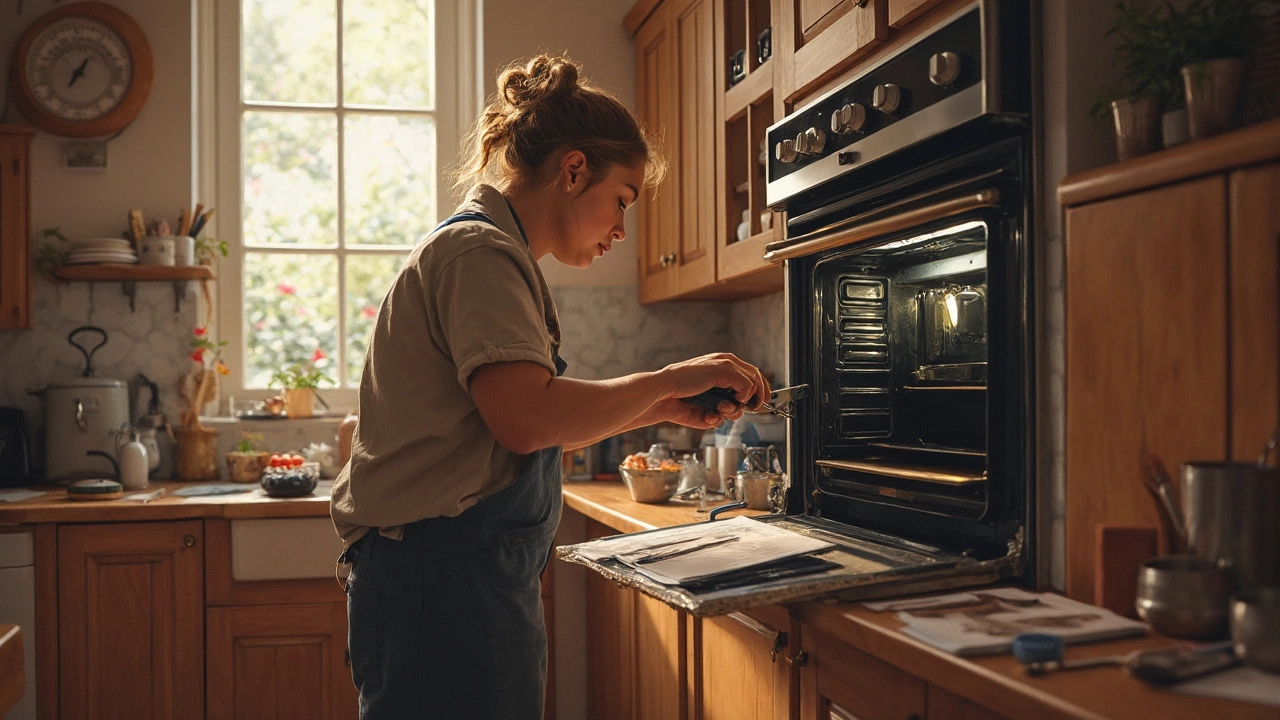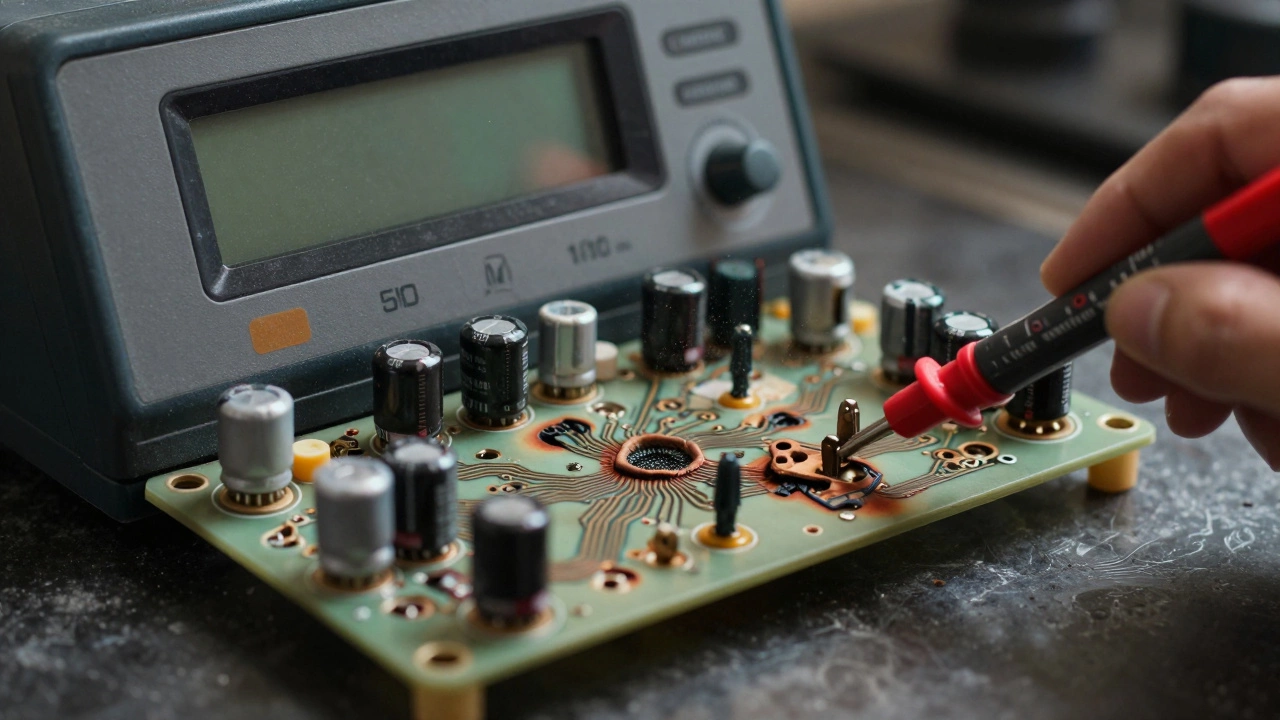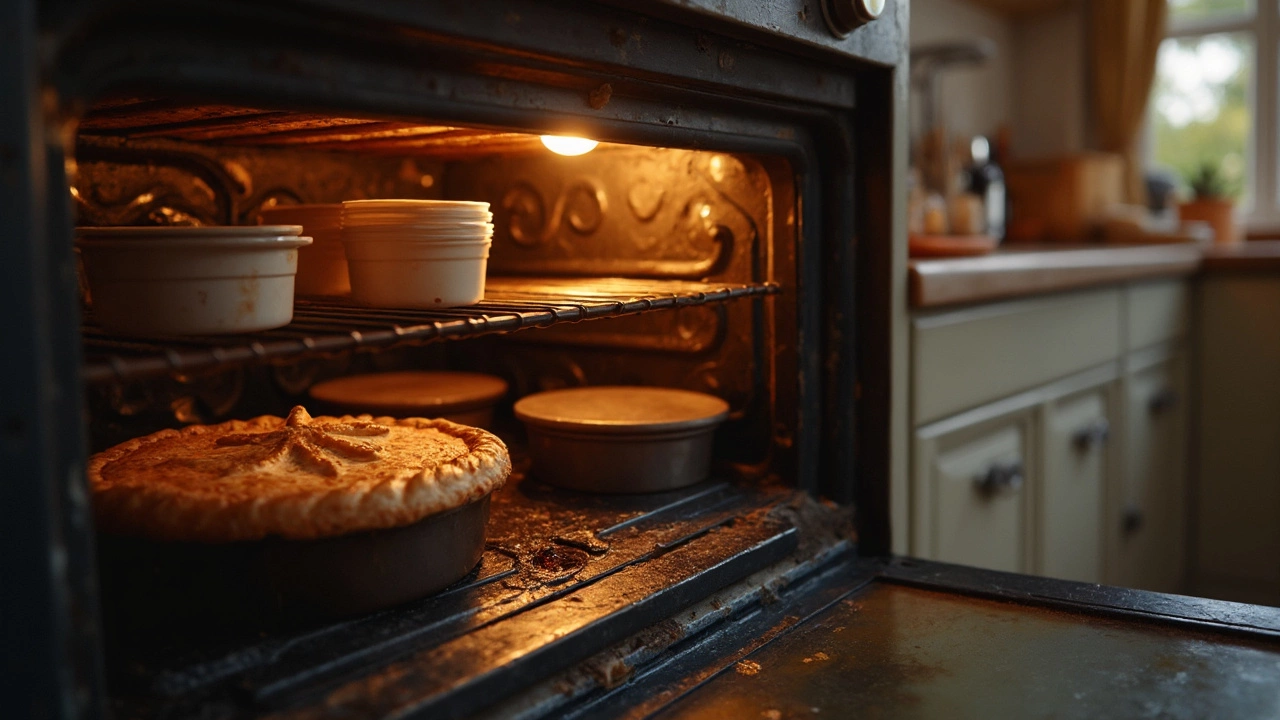
- 1 Jun 2025
- Gideon Thornton
- 0
You probably don’t think much about your oven until it starts acting up—or craps out in the middle of making dinner. Most people wonder at some point: how long is this thing supposed to last anyway?
The short answer? Most ovens stick around for 10 to 15 years, if you treat them right. Gas ovens tend to outlast electric ones, but not by much. Of course, there are folks still chugging along with appliances from the '90s, but those are the exception, not the rule.
Why does this matter? Knowing your oven’s shelf life helps you plan for big repairs or a replacement, so you’re not blindsided. If you’re debating a pricey repair, you’ll want to know if the oven’s got a few good years left—or if you’re just throwing money at a lost cause.
- Average Lifespan of Ovens
- Key Factors That Affect Longevity
- How to Spot a Failing Oven
- Pro Tips for Making Your Oven Last
Average Lifespan of Ovens
If you’re wondering how long an oven really lasts, you’re not alone. Most folks expect their oven to hold up for at least a decade, but a few details can shift that number up or down.
The average lifespan for most household ovens sits in the 10 to 15 year range. Gas models tend to come out on top, with some chugging along even after 15 years, while electric ovens usually start giving trouble closer to that 10-15 year window. Still, there are plenty of exceptions. Some high-end ovens manage 20 years with good care, while a cheap one might not make it past 7 years without major problems.
| Oven Type | Average Lifespan |
|---|---|
| Gas Oven | 13–17 years |
| Electric Oven | 10–15 years |
| Wall Oven (built-in) | 9–15 years |
| Range (oven + stove) | 13–16 years |
| Smart Oven | 8–13 years |
Why the difference? It’s not just about what powers your oven but also about usage and build. Wall ovens and fancy smart ovens, for example, sometimes don’t last as long because they’re packed with electronics that can fail first.
Big brands like Whirlpool and GE generally land right in that 10-15-year sweet spot, according to real world data from appliance repair pros. But keep in mind, it’s not set in stone. Heavy use (think: daily baking or roasting), poor maintenance, and cheap parts are all lifespan killers. If you treat your oven right, clean up spills fast, and avoid slamming the door, you’re way more likely to squeeze out every possible cooking year. So when it comes to your oven lifespan, a little care goes a long way.
Key Factors That Affect Longevity
Why do some ovens stick around for years and others kick the bucket early? It all comes down to what you buy, how you use it, and some random luck. But most of the time, certain details make a real difference.
- Oven lifespan depends on whether it's gas or electric. Gas ovens usually last about 15 years, while electric ones hang in there for around 13 years. That’s because gas ovens have fewer major parts that break.
- How often you cook matters. Families who use the oven every day just won’t get as many years out of it compared to someone baking once a month.
- The brand can be a big deal. Some brands are known for lasting longer—think Whirlpool, GE, and Bosch. Cheaper off-brand models often give out faster.
- How well you keep it clean. Gunked-up ovens force parts to work harder and overheat. A wiped-down, crumb-free oven is just less likely to break down.
- Repairs done right keep things humming. Skipping routine fixes, like replacing worn-out door seals, means everything else works harder to keep heat in.
Here’s a quick look at what affects how long your oven might last:
| Factor | Impact on Life Expectancy |
|---|---|
| Type (Gas vs. Electric) | Gas ovens last 2-3 years longer on average |
| Usage Frequency | Heavy use can cut lifespan by up to 30% |
| Brand Quality | Name brands average 2-5 more years |
| Cleanliness | Regular cleaning prevents overheating and wear |
| Proper Repairs & Maintenance | Tackling issues early stops bigger damage |
If you want your oven to put in extra years, don’t ignore things like a slow preheat or a door that’s not shutting tight. Those little issues can turn into oven-killers if you let them slide.
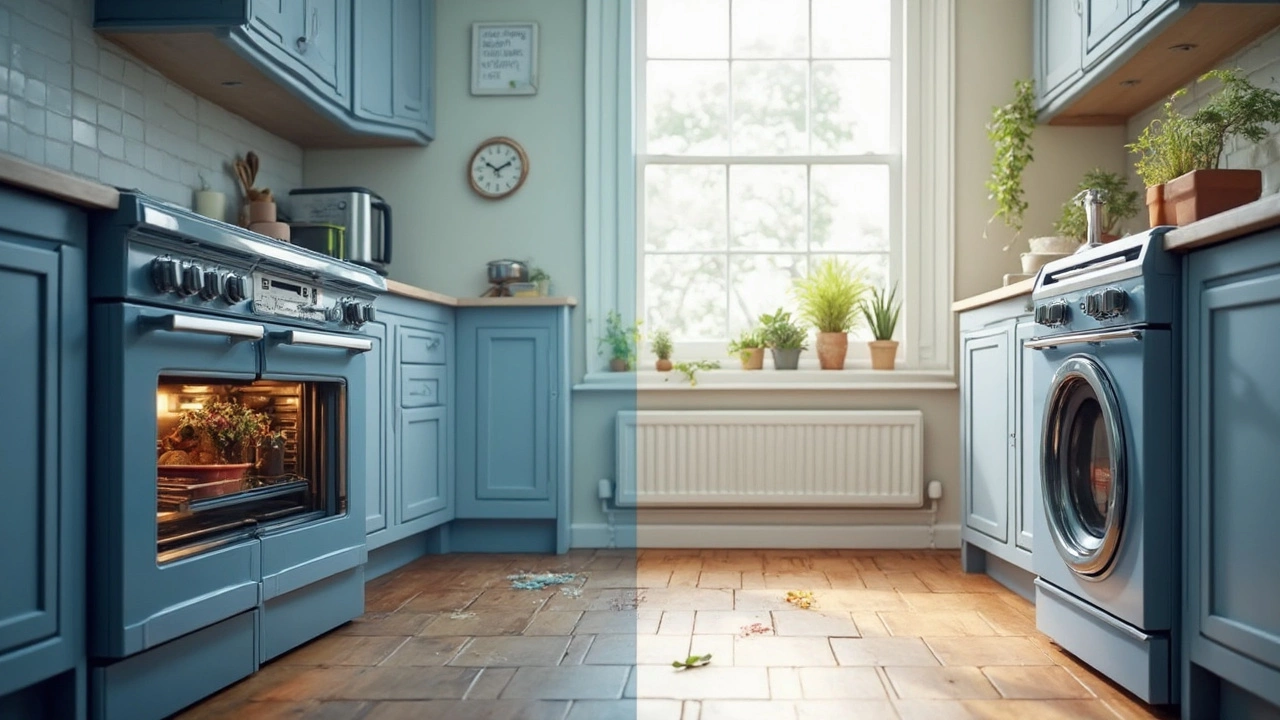
How to Spot a Failing Oven
Ovens don’t just quit without warning—most give you a heads up if you know what to look for. If your cookies are burnt on one side or your frozen pizza still has a cold center, your oven might already be on the decline. Uneven heating is one of the biggest clues that something’s going wrong.
Listen for weird sounds too. A healthy oven runs pretty quietly, but clanking, buzzing, or rattling noises could mean a fan or heating element is on its way out. Smelling odd odors? If you catch a faint gas smell, turn off the oven and get it checked ASAP. Gas leaks are nothing to mess with.
- Oven lifespan takes a hit when doors don’t seal right. If heat is escaping, your meals won’t cook evenly and your energy bill will creep up. Run your hand around the oven door while it’s on (carefully!) to feel for leaks. If the gasket looks cracked or crumbly, it’s time for a new one.
- Preheat times are another telltale sign. If your oven takes forever to reach the right temperature, that’s a classic hint the heating element is worn or there’s another electrical issue inside.
- Keep an eye on your digital display and controls. If settings reset, lights flicker, or numbers jump around, you might be looking at problems with the circuit board.
"An oven that regularly fails to maintain temperature or trip the circuit breaker is not just annoying—it’s a safety risk," says Jeremy Gerst, a certified appliance technician with over 20 years of field experience.
Don’t wait for your oven to totally fail. Noticing these warning signs early can give you a shot at a budget-friendly repair, or at least warn you when it’s time to start shopping around.
Pro Tips for Making Your Oven Last
If you want your oven to really go the distance, a few simple habits pay off big. A lot of oven trouble creeps up because of little things people forget—or skip entirely. These tips can put years back on the clock for your oven.
- Clean spills right away. Don’t let gunk bake onto the bottom or racks. Crusty messes force your oven to work harder and can mess with how evenly it cooks.
- Use the self-clean function—but not right before a big dinner. It cranks up extreme heat and can sometimes push older ovens to fail just when you need them.
- Change or wash the filter on a range hood if you’ve got one. Grease buildup from cooking traps heat around your oven, making the parts inside wear out faster.
- Don’t slam the oven door. It might feel tough, but the hinges and gasket aren’t indestructible. A gentle close keeps seals tight and heat where it belongs.
- Double-check oven seals every few months. If you feel heat leaking around the door, or if the rubber looks cracked, swap it out. A bad seal means longer cooking times and higher bills.
- Only use foil on racks if the manual says it’s safe. Lining the bottom with foil can block airflow and wear out the heating element fast.
- Get service for weird smells, strange noises, or inconsistent temps right away. Catching issues early often means a cheap fix.
Ever wonder how much of a difference these habits make? A quick look at the numbers:
| Habit | Potential Extra Years Added |
|---|---|
| Regular cleaning | 2-3 years |
| Replacing worn-out door seals | 1-2 years |
| Getting annual professional checkups | Up to 3 years |
| Avoiding overheating/overuse of self-clean | 1 year |
Treat your oven like a machine that needs thick skin but gentle hands, and you’ll squeeze more years—and more stress-free meals—out of it. And remember, the real secret to stretching your oven lifespan is just sticking to the little things, done often enough that they don’t feel like a chore.


